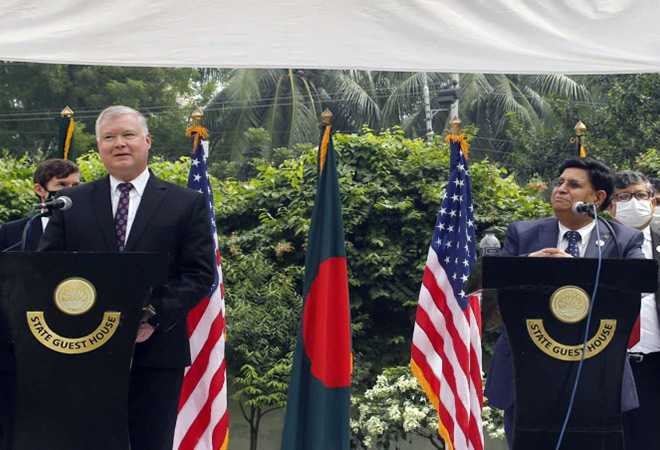Bangladesh: The dilemma over the Indo-Pacific Strategy

Image: Collected
US Deputy Secretary of State Stephan Biegun, during his visit to Bangladesh in October this season, observed that his country is looking towards Bangladesh as an integral partner in its Indo-Pacific Strategy (IPS). During his visit, Biegun met top Bangladeshi leaders, including Prime Minister Sheikh Hasina and Foreign Minister Abdul Momen and officials.
During the visit, the two countries discussed issues including long term economic and development partnership, cooperation on tackling the Covid-19 pandemic, Rohingya refugee crisis. However, Beigun’s primary emphasis in every the forums was on the IPS, indicating the US’s desire for Bangladesh to support the IPS.
Bangladesh, an associate of China’s Belt Road Initiative (BRI), however, has been cautious in its response since it fears any hasty reaction might be detrimental to the country’s interest. Dhaka’s apprehension comes from the popular perception of the IPS being truly a counter to the Chinese BRI.
Bangladesh is reluctant in joining a global initiative which has security and strategic ramifications. The united states is apprehensive that joining the Indo-pacific initiative might drag it right into a conflict. Not surprisingly scepticism, the US’s give attention to Bangladesh opens a realm of chance of the country. Bangladesh needs to introspect the way the US attention could possibly be utilised to its s best interest.
Economic ties
The IPS span over the parts of the Indian Ocean and the Pacific Ocean and is US’s major initiative in Asia. Beneath the IPS, the US propagate the vision of free, open, inclusive, peaceful and secure Indo-Pacific region, with shared prosperity for all. To realize this goal, US wants to expand economic ties with the countries in your community by involving greater private sector participation. Enhancing security cooperation is also an important aspect of the IPS.
Bangladesh’s geographical location is a key reason for the US’s interest in the country. The county is a littoral of the Bay of Bengal, the spot integral to the Indian Ocean and a major maritime trading route. Further, Bangladesh’s impressive economic and social development put into the US interest.
‘Basket case’ forget about
The country once known as a ‘basket case’ is one of the fastest-growing economies in Asia. In 2020, Bangladesh’s per capita income has surpassed India, it’s neighbour and regional power. The united states is a global leader in readymade garment export. It includes a strength of human capital due to the presence of a big young population with an impressive human developmental record.
Bangladesh is now regarded as a country of potential. Since the IPS focus on strengthening the business enterprise relationship with countries of the region, Bangladesh’s credentials create the IPS lucrative for the firms to participate in. Bangladesh could be an ideal destination for the firms to purchase that could bring significant dividends to the firms.
Both basic objectives of Bangladesh’s foreign policy have already been enhancing financial development and trade. Given these objectives, Bangladesh could considerably gain from the IPS. In this regard, infrastructure is an area where Bangladesh could gain substantially from the IPS. Notably, the development of the infrastructure has been one the focal section of the IPS.
Interestingly, Bangladesh is emphasising on developing its infrastructure also. The country is seeking financial the help of various international agencies to aid various infrastructure developmental activities. One of the primary known reasons for Bangladesh to join the BRI was the financing of its infrastructure project. China has promised to provide $24 billion for the development of infrastructure in the country. IPS may help Bangladesh to secure funding for various developmental work.
Security alliance?
Regardless of the IPS’ thrust on development, it really is perceived more as security alliance and has been a cause for Bangladesh’s reticence. The favorite opinion in the country has been that the IPS is contradictory to the country’s foreign policy principle - ‘friendship to all or any and malice to none’. Bangladesh fears joining the IPS might upset its relationship with China, its strategic ally.
Similarly, the country cannot overlook its relationship with the US. The US is a major development partner. Besides, it has close monetary and security relations. The US may be the single most significant export destination of Bangladesh RGM, country’s biggest export product. Besides, the US is the second biggest investor in Bangladesh.
The IPS has put Bangladesh in a crucial situation. The challenge before the country is how to balance its relationship with China and the US without upsetting its interest. Until date, the united states has fared well in maintaining an excellent relationship with all the great global powers. It will be worthy to watch Bangladesh’s future moves in tackling the strategic challenges that might arise as the global powers increasingly become assertive in explicating their influence in the region.
Source: https://www.orfonline.org
Tags :
Previous Story
- Bangladesh, US Trade Ties under Biden Administration
- US keen to greatly help Bangladesh diversify its...
- Apple to Use Retail Stores as Distribution Centers...
- U.S. government probes Microsoft's effort to boost diversity
- US rush to Bangladesh revs up economic race...
- 90pc business software in Bangladesh is pirated: US...
- Salman: Economic diplomacy to keep with major global...
- US-Bangladesh Economic Growth meeting on Wednesday